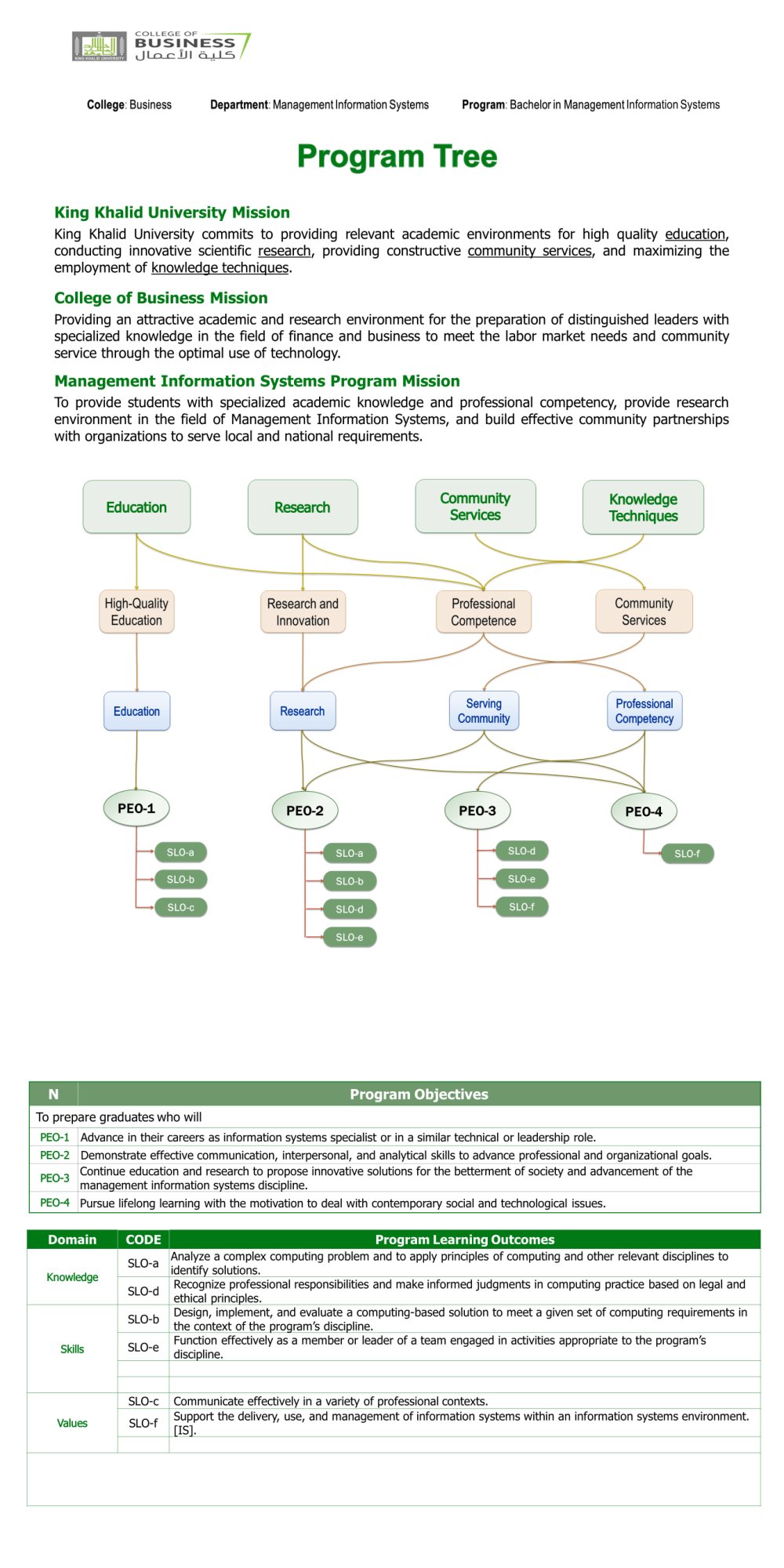Program Information:
Program mission
To provide students with specialized academic knowledge and professional competency, provide a research environment in the field of Management Information Systems, and build effective community partnerships with organizations to serve local and national requirements.
Program goals
The program goals of the Bachelor of Management Information Systems program are coherent with the goals of the department. The following are the goals of the program:
- Preparing students with technical skills, competitiveness and knowledge level in the field of Management Information Systems.
- Providing graduates with the skills of dealing with contemporary technologies to meet the market requirements.
- Facilitating students for innovative research approach in their capstone projects.
- Contributing actively to the community service through building community partnerships and meeting the requirements of the business sector of human resources and specialized expertise.
- Anticipating national and international academic program accreditations.
Program educational objectives (PEOs)
In consistency with the goals of the university, college and the department, the educational objectives of the program are established with the aim of producing graduates who will be able to:
PEO 1: Advance in their careers as information systems specialist or in a similar technical or leadership role.
PEO 2: Demonstrate effective communication, interpersonal, and analytical skills to advance professional and organizational goals.
PEO 3: Continue education and research to propose innovative solutions for the betterment of society and advancement of the management information systems discipline.
PEO 4: Pursue lifelong learning with the motivation to deal with contemporary social and technological issues.
Mapping of Program Mission to Program Educational Objectives:
|
|
Program Educational Objectives |
||||
|
|
|
PEO 1 |
PEO 2 |
PEO 3 |
PEO 4 |
|
Program Mission |
Quality Education |
|
|
* |
|
|
Technical Skills |
* |
|
|
* |
|
|
Research |
|
|
* |
|
|
|
Community Partnership |
* |
* |
* |
* |
|
Student Outcomes:
|
SLO codes |
Student Outcomes (SOs) or Student Learning Outcomes (SLOs) |
|
a |
Analyze a complex computing problem and to apply principles of computing and other relevant disciplines to identify solutions. |
|
b |
Design, implement, and evaluate a computing-based solution to meet a given set of computing requirements in the context of the program’s discipline. |
|
c |
Communicate effectively in a variety of professional contexts. |
|
d |
Recognize professional responsibilities and make informed judgments in computing practice based on legal and ethical principles. |
|
e |
Function effectively as a member or leader of a team engaged in activities appropriate to the program’s discipline. |
|
f |
Support the delivery, use, and management of information systems within an information systems environment. [IS] |
Relationship of SOs to PEOs:
|
PEO-codes |
Program Educational Objectives (PEOs) |
|
PEO-1 |
Advance in their careers as information systems specialist or in a similar technical or leadership role. |
|
PEO-2 |
Demonstrate effective communication, interpersonal, and analytical skills to advance professional and organizational goals. |
|
PEO-3 |
Continue education and research to propose innovative solutions for the betterment of society and advancement of the management information systems discipline. |
|
PEO-4 |
Pursue lifelong learning with the motivation to deal with contemporary social and technological issues. |
Mapping of PEOs to SOs:
|
SLOs |
Program Educational Objectives |
||||
|
ABET code |
PEO-1 |
PEO-2 |
PEO-3 |
PEO-4 |
|
|
a |
ü |
ü |
|
|
|
|
b |
ü |
ü |
|
|
|
|
c |
ü |
|
|
|
|
|
d |
|
ü |
ü |
|
|
|
e |
|
ü |
ü |
|
|
|
f |
|
|
ü |
ü |
|
Program tree
